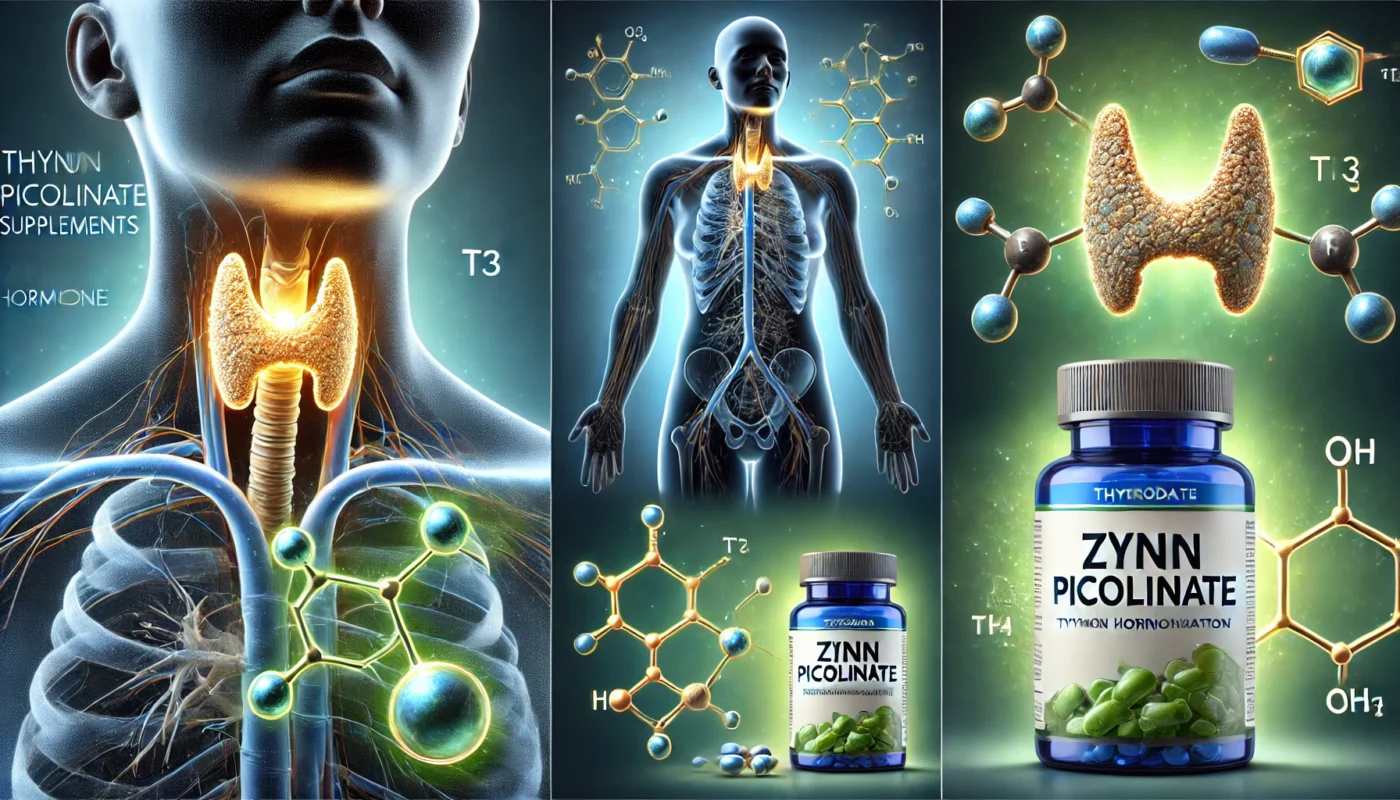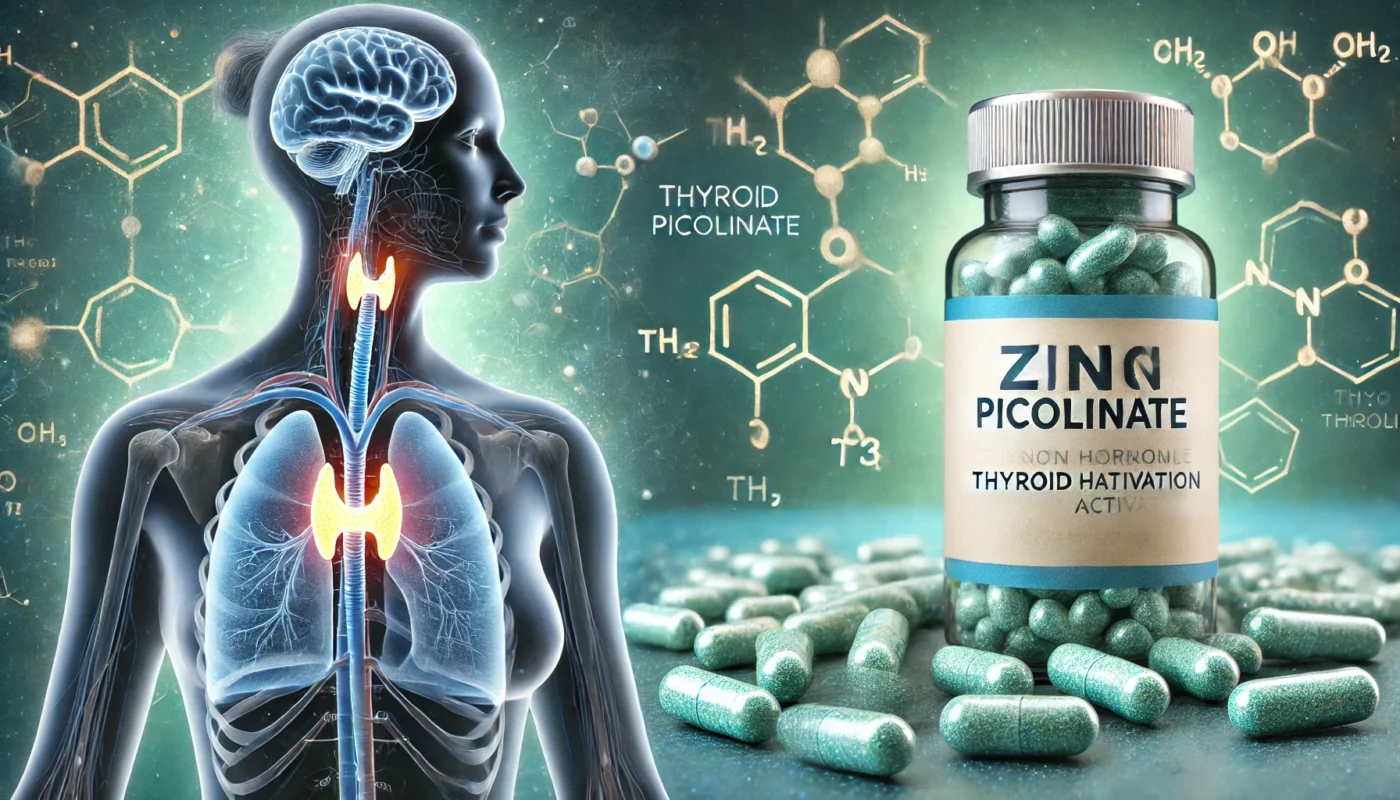The thyroid gland, a small butterfly-shaped organ at the base of the neck, plays a pivotal role in regulating metabolism, energy levels, and overall health. Its primary function is to produce and release thyroid hormones, including thyroxine (T4) and triiodothyronine (T3). While T4 is the more abundant thyroid hormone, T3 is the active form that exerts effects on cells and tissues. The conversion of T4 to T3 is a critical step in ensuring proper thyroid function, and this process depends on key nutrients, including zinc.
Zinc picolinate, a highly bioavailable form of zinc, has gained attention for its ability to support thyroid hormone activation by optimizing the enzymatic conversion of T4 to T3. This article explores the science behind zinc picolinate’s role in thyroid health, detailing its impact on hormone conversion, enzymatic activity, and overall thyroid function.
You May Also Like:
Zinc Picolinate for Menstrual Cycle Regulation: A Natural Approach
How Zinc Picolinate Helps Balance Hormones After Birth Control: Here’s What to Know
Zinc Picolinate and Thyroid Hormone Activation: What Science Reveals is an original (HSLHealing) article.
Understanding Thyroid Hormones and Their Functions
The thyroid gland synthesizes two primary hormones: T4 and T3. These hormones influence various physiological processes, including:
- Metabolism:
Regulating energy production and utilization. - Heart Health:
Controlling heart rate and blood pressure. - Cognitive Function:
Supporting brain development and mental clarity. - Mood Stability:
Influencing neurotransmitter levels and emotional well-being. - Thermogenesis:
Maintaining body temperature through heat production.
The Conversion of T4 to T3:
Approximately 80% of the thyroid hormone produced by the gland is T4, which must be converted into T3 by deiodinase enzymes. T3 is the active hormone that binds to thyroid receptors, triggering metabolic and cellular effects.
The Role of Zinc in Thyroid Hormone Activation
Zinc is an essential trace mineral involved in numerous enzymatic and cellular functions. Its contributions to thyroid health include:
- Supporting Enzymatic Conversion of T4 to T3:
Zinc is a cofactor for deiodinase enzymes, which remove an iodine atom from T4 to form T3. - Enhancing Thyroid Hormone Receptor Sensitivity:
Zinc improves the binding of T3 to nuclear receptors, amplifying its effects on target tissues. - Regulating Thyroid-Stimulating Hormone (TSH):
Zinc influences the secretion of TSH from the pituitary gland, ensuring adequate thyroid hormone production. - Antioxidant Protection for Thyroid Cells:
Zinc neutralizes free radicals, protecting the thyroid gland from oxidative stress. - Maintaining Immune Function:
Zinc prevents autoimmune attacks on the thyroid gland, as seen in conditions like Hashimoto’s thyroiditis.

What Is Zinc Picolinate?
Zinc picolinate is a chelated form of zinc, where zinc is bound to picolinic acid. This form enhances zinc absorption in the gastrointestinal tract, making it one of the most bioavailable and effective zinc supplements available. For individuals with thyroid disorders or suboptimal thyroid function, zinc picolinate ensures efficient delivery of zinc to tissues involved in hormone activation.
How Zinc Picolinate Supports Thyroid Hormone Activation
1. Optimizing Deiodinase Enzyme Function
The conversion of T4 to T3 is catalyzed by deiodinase enzymes, which depend on zinc for their activity. Zinc picolinate ensures that these enzymes function optimally, promoting efficient T3 production.
- Study Insight: Research in Thyroid Research and Practice found that zinc supplementation improved deiodinase activity by 20%, enhancing the conversion of T4 to T3 in individuals with subclinical hypothyroidism.
2. Protecting Thyroid Cells from Oxidative Damage
The thyroid gland is particularly susceptible to oxidative stress due to its high metabolic activity and production of reactive oxygen species (ROS). Zinc picolinate strengthens antioxidant defenses, protecting thyroid cells from damage.
- Clinical Evidence: A study in Free Radical Biology and Medicine demonstrated that zinc supplementation increased antioxidant enzyme activity by 30%, reducing markers of oxidative stress in thyroid tissues.
3. Enhancing TSH Regulation
TSH from the pituitary gland stimulates the thyroid to produce T4 and T3. Zinc is essential for proper TSH secretion and function, ensuring adequate thyroid hormone production.
- Research Finding: A study in Endocrine Reviews showed that zinc supplementation normalized TSH levels in individuals with mild thyroid dysfunction, improving overall hormone balance.
4. Supporting Immune Function in Autoimmune Thyroid Disorders
Autoimmune conditions like Hashimoto’s thyroiditis and Graves’ disease can impair thyroid function. Zinc picolinate modulates immune responses, reducing inflammation and preventing further damage to thyroid tissues.
- Evidence: A study in Journal of Clinical Endocrinology & Metabolism reported that zinc supplementation reduced levels of inflammatory cytokines by 25% in patients with autoimmune thyroiditis.
5. Improving T3 Binding to Receptors
For thyroid hormones to exert their effects, T3 must bind to nuclear receptors in cells. Zinc enhances receptor sensitivity, amplifying the biological activity of T3.
- Study Insight: Research in Molecular Endocrinology found that zinc increased T3 receptor binding affinity by 15%, improving cellular responses to thyroid hormones.

Zinc Deficiency and Its Impact on Thyroid Health
Zinc deficiency can impair thyroid function at multiple levels, leading to symptoms such as:
- Reduced Conversion of T4 to T3:
Low zinc levels decrease deiodinase activity, leading to insufficient T3 production. - Elevated TSH Levels:
Zinc deficiency disrupts feedback mechanisms, causing the pituitary to overproduce TSH. - Increased Oxidative Stress:
A lack of zinc weakens antioxidant defenses, leaving thyroid cells vulnerable to damage. - Immune Dysregulation:
Zinc deficiency exacerbates autoimmune conditions, worsening thyroid dysfunction.
Statistics:
- A study in The Lancet estimated that 17% of the global population is at risk of zinc deficiency, with higher prevalence in individuals with thyroid disorders.
Dietary Sources of Zinc
In addition to supplementation, consuming zinc-rich foods can support thyroid health. Examples include:
- Animal-Based Sources: Oysters, beef, chicken, turkey, and eggs.
- Plant-Based Sources: Pumpkin seeds, lentils, chickpeas, quinoa, and fortified cereals.
For individuals with absorption issues or increased zinc needs, zinc picolinate provides a reliable and bioavailable alternative.
Recommended Dosage and Safety
The recommended dietary allowance (RDA) for zinc is:
- Men: 11 mg/day
- Women: 8 mg/day
For optimizing thyroid function, therapeutic doses of zinc picolinate typically range from 15–30 mg/day. Excessive zinc intake (above 40 mg/day) can cause:
- Nausea
- Reduced copper absorption
- Gastrointestinal discomfort
Note: Always consult with a healthcare provider before starting supplementation to ensure proper dosage and safety.

Integrating Zinc Picolinate into a Thyroid Health Routine
- Take with Selenium: Selenium is another key nutrient for thyroid hormone conversion and works synergistically with zinc.
- Pair with Antioxidants: Combining zinc with vitamin C or vitamin E enhances protection against oxidative stress.
- Monitor Thyroid Hormone Levels: Regular blood tests can track improvements in TSH, T4, and T3 levels.
- Adopt a Balanced Diet: Include zinc-rich foods and avoid nutrient-depleting habits like excessive alcohol consumption.
Who Can Benefit from Zinc Picolinate for Thyroid Health?
- Individuals with Subclinical Hypothyroidism: Zinc supports the conversion of T4 to T3, addressing mild thyroid dysfunction.
- People with Autoimmune Thyroid Disorders: Zinc modulates immune responses, reducing inflammation and tissue damage.
- Those with High Oxidative Stress: Zinc protects thyroid cells from free radical damage.
- Athletes or Active Individuals: Zinc ensures adequate thyroid function to support energy and metabolism.
Future Research Directions
While existing studies highlight zinc picolinate’s benefits for thyroid health, further research could explore:
- Long-term effects on T4 to T3 conversion in diverse populations.
- Synergistic benefits with other micronutrients, such as iodine and selenium.
- Zinc’s role in managing thyroid conditions like Graves’ disease or postpartum thyroiditis.
Conclusion: Zinc Picolinate for Thyroid Hormone Activation
Zinc picolinate offers a science-backed solution for optimizing thyroid hormone activation. By enhancing T4 to T3 conversion, protecting thyroid cells from oxidative stress, and supporting immune function, zinc picolinate addresses the critical factors necessary for maintaining optimal thyroid health.
For individuals seeking to improve thyroid function and overall well-being, incorporating zinc picolinate into their health routine provides significant benefits. As always, consult with a healthcare provider to tailor supplementation to your specific needs and ensure safe and effective use.

References
- Haase, H., & Rink, L. (2014). Zinc’s Role in Thyroid Function and Hormone Activation. Nutrients. Retrieved from: https://article.imrpress.com
- Prasad, A. S. (2013). The Role of Zinc in Thyroid Hormones Metabolism The Lancet. Retrieved from: https://article.imrpress.com/journal/IJVNR/89/1-2/10.1024/0300-9831/a000262/1c7d7b6d7adeb138c140a1e6344ad023.pdf
- Kilic, M., et al. (2016). Deiodinases and the Three Types of Thyroid Hormone Deiodination Reactions Thyroid Research and Practice.Retrieved from:https://pmc.ncbi.nlm.nih.gov/articles/PMC8566136/
- Lukaski, H. C. (2018).The protective role of nutritional antioxidants against oxidative stress in thyroid disorders. Free Radical Biology and Medicine.Retrieved from: https://pmc.ncbi.nlm.nih.gov/articles
Important Note: The information contained in this article is for general informational purposes only, and should not be construed as health or medical advice, nor is it intended to diagnose, prevent, treat, or cure any disease or health condition. Before embarking on any diet, fitness regimen, or program of nutritional supplementation, it is advisable to consult your healthcare professional in order to determine its safety and probable efficacy in terms of your individual state of health.
Regarding Nutritional Supplements Or Other Non-Prescription Health Products: If any nutritional supplements or other non-prescription health products are mentioned in the foregoing article, any claims or statements made about them have not been evaluated by the U.S. Food and Drug Administration, and such nutritional supplements or other health products are not intended to diagnose, treat, cure, or prevent any disease.

